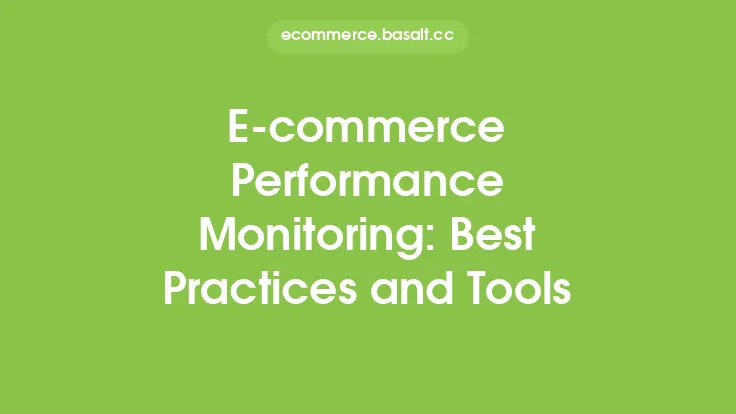As the world becomes increasingly digital, the e-commerce industry has experienced rapid growth, with more and more consumers turning to online shopping for its convenience and accessibility. However, this growth has also raised concerns about the environmental impact of e-commerce, from the production and transportation of goods to the packaging and disposal of waste. In response, many online retailers are now prioritizing environmental sustainability, recognizing that it is not only a moral imperative but also a business opportunity.
Introduction to E-commerce Sustainability
E-commerce sustainability refers to the practices and strategies that online retailers can use to reduce their environmental impact, from reducing energy consumption and waste to promoting sustainable products and supply chains. This can involve a range of initiatives, from using renewable energy sources and reducing packaging to implementing sustainable shipping practices and promoting eco-friendly products. By prioritizing sustainability, online retailers can not only reduce their environmental footprint but also enhance their brand reputation, build customer loyalty, and improve their bottom line.
Assessing Environmental Impact
The first step towards achieving e-commerce sustainability is to assess the environmental impact of your online retail business. This involves identifying areas where your business can improve, from energy consumption and waste management to supply chain practices and product sourcing. You can use tools such as carbon footprint calculators and sustainability audits to help you assess your environmental impact and identify areas for improvement. By understanding your environmental footprint, you can develop a comprehensive sustainability strategy that addresses your specific needs and challenges.
Sustainable Supply Chain Management
Sustainable supply chain management is critical to e-commerce sustainability, as it involves ensuring that the products you sell are sourced and produced in an environmentally responsible manner. This can involve working with suppliers who use sustainable practices, such as renewable energy and eco-friendly materials, and implementing sustainable logistics and transportation practices. You can also consider using sustainable packaging materials, such as biodegradable or recyclable packaging, to reduce waste and minimize your environmental impact.
Energy Efficiency and Renewable Energy
Energy efficiency and renewable energy are essential components of e-commerce sustainability, as they can help reduce your business's carbon footprint and reliance on non-renewable energy sources. You can implement energy-efficient practices, such as using LED lighting and energy-efficient equipment, and consider investing in renewable energy sources, such as solar or wind power. By reducing your energy consumption and reliance on non-renewable energy sources, you can minimize your environmental impact and improve your brand reputation.
Sustainable Product Sourcing
Sustainable product sourcing is another critical aspect of e-commerce sustainability, as it involves ensuring that the products you sell are produced and sourced in an environmentally responsible manner. You can consider sourcing products from suppliers who use sustainable practices, such as organic farming or eco-friendly materials, and look for products that are certified by organizations such as the Forest Stewardship Council (FSC) or the Marine Stewardship Council (MSC). By promoting sustainable products, you can not only reduce your environmental impact but also appeal to customers who are increasingly looking for eco-friendly products.
Customer Education and Engagement
Customer education and engagement are essential to e-commerce sustainability, as they involve raising awareness about the importance of sustainability and encouraging customers to make environmentally responsible choices. You can educate customers about the environmental impact of their purchasing decisions and provide them with information about sustainable products and practices. You can also encourage customers to participate in sustainability initiatives, such as recycling programs or carbon offsetting schemes, and offer incentives for customers who make sustainable choices.
Measuring and Reporting Sustainability Performance
Measuring and reporting sustainability performance is critical to e-commerce sustainability, as it involves tracking and communicating your progress towards sustainability goals. You can use sustainability metrics, such as carbon footprint or waste reduction, to measure your sustainability performance and report on your progress to stakeholders, including customers, investors, and suppliers. By measuring and reporting your sustainability performance, you can demonstrate your commitment to sustainability and identify areas for improvement.
Best Practices for Online Retailers
There are several best practices that online retailers can follow to prioritize e-commerce sustainability, from reducing energy consumption and waste to promoting sustainable products and supply chains. Some of these best practices include:
- Using renewable energy sources and reducing energy consumption
- Implementing sustainable packaging practices, such as using biodegradable or recyclable packaging
- Promoting sustainable products and supply chains
- Encouraging customer education and engagement
- Measuring and reporting sustainability performance
- Implementing sustainable logistics and transportation practices
- Reducing waste and promoting recycling programs
Conclusion
E-commerce sustainability is a critical aspect of the online retail industry, as it involves reducing the environmental impact of e-commerce and promoting sustainable practices. By prioritizing sustainability, online retailers can not only reduce their environmental footprint but also enhance their brand reputation, build customer loyalty, and improve their bottom line. By following best practices, such as reducing energy consumption and waste, promoting sustainable products and supply chains, and encouraging customer education and engagement, online retailers can contribute to a more sustainable future and achieve long-term success.





